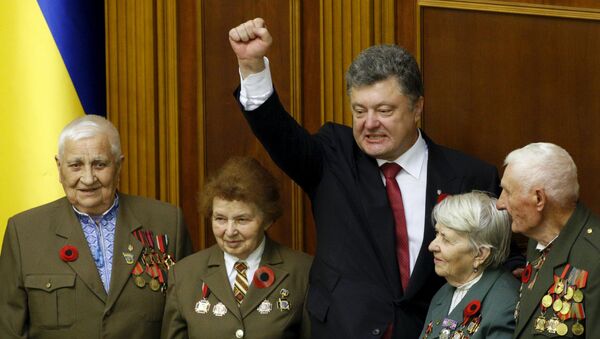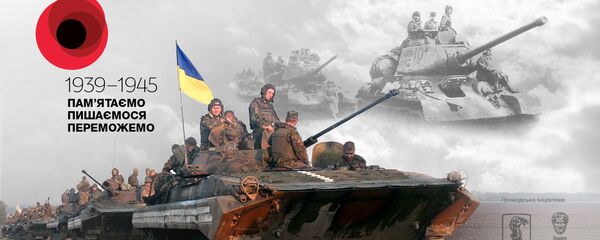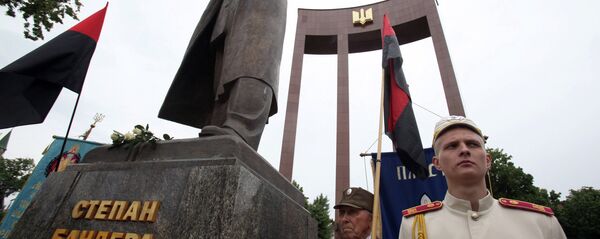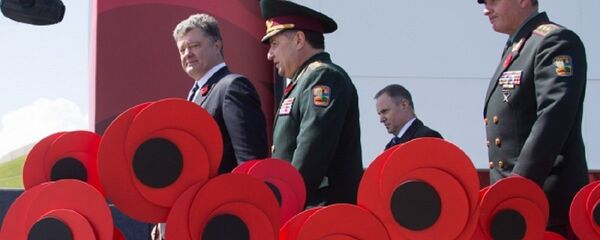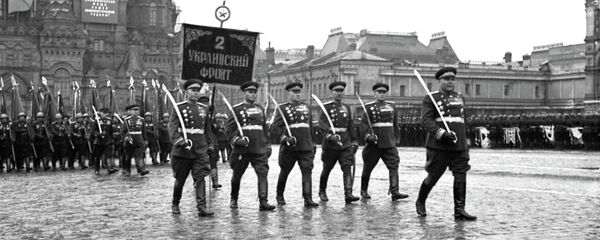Laws Either Contradictory or Highly Cynical
Formally, the law condemning communism equates the ideology and its symbols with Nazism. In this way, it pays lip service to initiatives launched several years earlier by lawmakers in several other Eastern European countries. However, given its place among a package of bills which also glorify Nazi collaborationist 'fighters for independence', the attempt to outlaw communist ideology through a declaration of its moral equivalency with Nazism seems contradictory at best, and outright cynical at worst.
Given post-Maidan Kiev's attempts to rewrite the history of OUN-UPA as an Allied force in the fight against Nazi Germany, Poroshenko's signing of the bill glorifying the group has also provided authorities with the legal mandate to make challenging such a claim punishable by law. This was confirmed by Poroshenko's press service, which noted in its commentary on the passage of the decommunization laws that the president also intends to introduce a bill to Ukraine's parliament aimed at further "toughening the standards of liability" for challenging the memorialization of Ukrainian fighters for independence.
Армия союзников и УПА плечом к плечу.Новейшая история Украины. pic.twitter.com/rwAoitGABH
— ОтецРусскойДемократи (@Mayskolpino) 7 мая 2015
"The Allied Armies and UPA shoulder to shoulder. The new history of Ukraine." Pictured: 'Number of Ukrainians in the Armies of the Allies' [Circled: Ukrainian Insurgent Army – 100,000]
President Approves Rada's Expensive, Ludicrous Struggle Against a Dead Horse
The idea promoted by some among the Kiev political elite, that the ban on communism is related more to a struggle against a 'Russian ideology', also falls flat on its face, given that Russia too rejected the communist ideology, and because Ukrainian communists played a key role in the construction and advancement of the Soviet system. Ethnic Ukrainians Nikita Khrushchev and Leonid Brezhnev lead the country for over twenty years, after all.
The Ukrainian parliament's anti-communist witch hunt has led to fears that the ban would target not only public symbols of Soviet power, but also less visible but no less important symbols, including veterans' medals. Moreover, critics have commented on the expensive bureaucratic nightmare that the proposal is set to unleash. With literally thousands of city, town, village and street names slated for being renamed, and tens of thousands of communist symbols earmarked to be removed from buildings, monuments, gates and facades, the campaign is projected to cost the country's cash-strapped budget billions of hryvnia. Moreover, once streets are renamed, an estimated two million people, businesses and public organizations will have to line up in government offices to have their documents changed.
Last month, political scientist Vadim Karacev told Ukrainian news hub Vesti that the laws on decommunization will serve only to further weaken the Maidan authorities' political influence in the south and east of the country. Josh Cohen argues that that the laws will definitely serve to split "eastern and western Ukrainians," who "already possess widely diverging views on recent political events such as the collapse of the Soviet Union and the Maidan revolution." As for the law glorifying OUN-UPA fighters, Cohen argues that the law will only serve to "exacerbate these regional differences," with "Eastern Ukrainians…viewing these groups as Nazi collaborators to be feared and condemned rather than celebrated."
